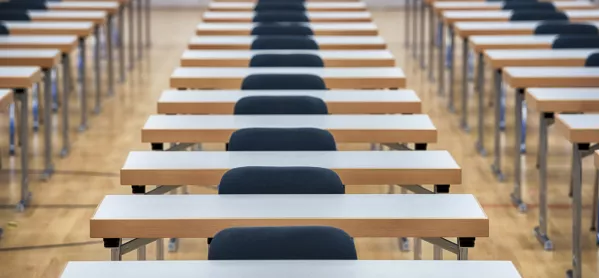MPs have called on the education secretary to provide a “route map” to ensure that grade inflation caused by temporary changes to GCSE and A-level assessment is not “baked” permanently into the exams system.
In a letter to Gavin Williamson, Commons Education Select Committee chair Robert Halfon said there needed to be a “route map to transition back to the grade standards that existed prior to the pandemic so that we know for sure that grade inflation has not been permanently baked into the system”.
GCSEs 2021: Covid means generous grading, says Ofqual
News: Third Covid wave ‘could cancel GCSE and A-level exams’
2021 exams: Autumn grades boosted by summer ‘generosity’
Mr Halfon acknowledged that Ofqual had decided to extend the higher grades of 2020 - when teacher-assessed grades were awarded - to 2021, with inflation balanced out more evenly across subjects.
Coronavirus: Fears over GCSE and A-level grade inflation
“The principal reason for doing this, we understand, is to allow fairness between students taking exams in these years affected by the pandemic and because Ofqual’s research found virtually no support for returning to established standards in the year ahead,” he said.
But his letter asked how the 2020 grade inflation could be ” washed out of the system once you deem it is appropriate to do so”.
The committee also called for more details on contingency plans for students who cannot sit GCSEs or A levels next summer.
Mr Halfon’s letter cited the “severe disruption” to some students’ learning and said that while the package of support measures for exams cohorts next year would go “some way to address this variation”, he added that it is “likely that those who suffered most will remain in a weaker position and at a comparative disadvantage”.
The government announced support measures for GCSE and A-level students earlier this month. The generosity of 2020 grading will be kept next year but spread more evenly across subjects.
Students will be given aids in some exams to boost their confidence and reduce the amount of information they need to memorise, as part of the measures, as well as vocabulary lists for languages exams.
And they will also be given advance notice of topics in their exams from January.
Mr Halfon said that “certain students, through no fault of their own, have experienced ongoing disruptions to their learning, and even if they were available to sit exams, could not be expected to do so on a fair basis”, and that the numbers affected could be “significant”.
The committee’s letter called on Mr Williamson to clarify contingency plans for this group, and questioned how teacher-validated grades would work for these students in practice.
The letter said Ofqual should announce subject areas featured in next year’s exams as soon as possible.
And it urged the Department for Education to recruit “former teachers” as volunteer markers and invigilators for exams in 2021.
Heads have previously raised concerns over the number of invigilators next year.
The education committee said the DfE should “be expected to cover the extra costs, such as charges for DBS checks and volunteers’ incidental expenses”.
And it called for more information on the new advisory group on differential learning loss announced in early December.
“We would welcome more information from you on the membership of this advisory panel and how it will operate. We believe the panel should include school representatives from areas across the country most impacted by disruptions and the pandemic,” the letter said.
“We are interested to know by when the advisory panel will be asked to confirm any further changes that are needed and if you remain open to acting on any recommendations relating to this summer’s exam series.”
The committee also called on the DfE to publish attendance data weekly on both a national and local basis, by school year, “particularly for those students in exam years and leading up to exam years”.
“Ideally, this information would be collated at a postcode level, so that more refined data are available to show the cumulative impact on students in different parts of the country,” the letter said, asking the DfE to commit to publishing this information.

